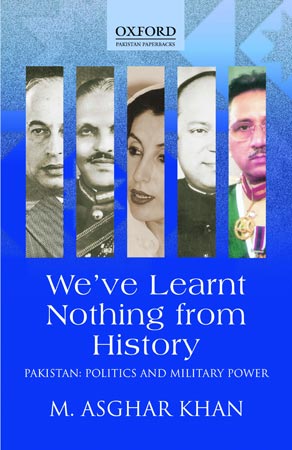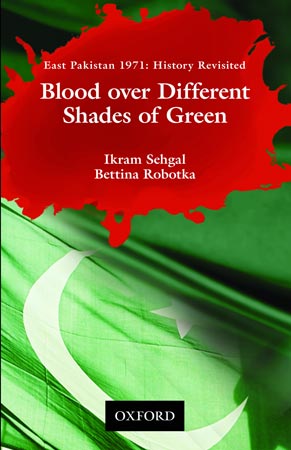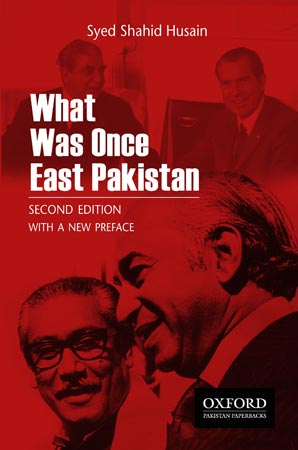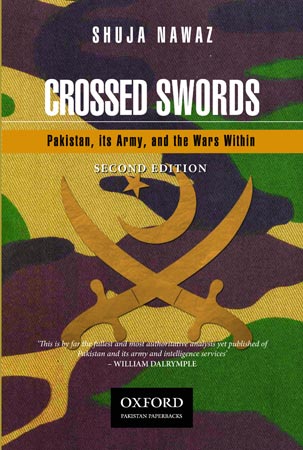 We’ve Learnt Nothing from History
We’ve Learnt Nothing from History
Pakistan: Politics & Military Power
M Asghar Khan
In this book, Air Marshal (r) M Asghar Khan presents an insider’s view of Pakistan’s struggle for democracy from the 1960s to the present. The book expounds on the early entry of Pakistan’s armed forces into the country’s politics and the author’s opposition to military rule that began in 1968 with the Movement for the Restoration of Democracy. This movement resulted in the ouster of President Muhammad Ayub Khan in 1969 after eleven years of military rule. The author describes his continued opposition to autocratic and dictatorial rule, especially General Yahya Khan’s policy of brutal suppression through military action in East Pakistan.

East Pakistan 1971: History Revisited
Ikram Sehgal & Bettina Robotka
The famous British philosopher of history RG Collingwood suggested that a historian must ‘reconstruct’ history by using ‘historical imagination’ to ‘re-enact’ the thought processes of historical persons based on information and evidence from historical sources. That is what the authors of the present book have tried to do. The events of 1971 that resulted in the breakup of Pakistan are a milestone in Pakistan’s history. To retrieve what happened and why it happened is an exercise that so far has been avoided or left at best incomplete. The book based on published and unpublished memories of activists of 1971 attempts to give a critical assessment of the events and spell out lessons that have to be learnt.

Second Edition with a New Preface
Syed Shahid Husain
Serving at three places in East Pakistan, now Bangladesh, during the critical period between 1969 and 1971, Syed Shahid Husain saw the events unfold and presents in this book an analysis of the roles that each of the principal actors-Yahya Khan, Sheikh Mujibur Rahman, and Zulfikar Ali Bhutto-played. He saw history in the making and the five decades that have passed since have not affected his conclusions. Facts are unchangeable, and it is only the opinions that differ. As Macaulay said, ‘Facts are the mere dross of history. It is from the abstract truth which interpenetrates them and lies latent among them, like gold in the ore, that the mass derives its whole value….’ The book also contains some of his personal experiences at the time including an account of the killer cyclone that hit East Pakistan in 1970.

Shakil Durrani
This book chronicles the author’s account of his public service of over forty years while serving at the highest levels of civil governments in different provinces of Pakistan, including the Tribal Areas, Gilgit-Baltistan and Azad Kashmir. The author records his account from his own distinct perspective. The book is insightful and remarkable in its authenticity and frankness. It is both a personal memoir and a reflection on Pakistan’s system of administration. Durrani has an insider’s view of many of the critical issues of governance and development which Pakistan faces. His long career covers a critical period of Pakistan’s recent history and he is a valuable witness to it. The book will be of interest not only to the reading public of Pakistan but to specialists, academics, diplomats, journalists and development practitioners.

Pakistan, its Army & the Wars Within
Second Edition
Shuja Nawaz
This is a profound and multi-layered analysis of the nature and role of the Pakistan Army in the country’s polity as well as its turbulent relationship with the United States. Using several hitherto unpublished materials, Shuja Nawaz lays bare key facts about Pakistan’s numerous wars with India and its many rounds of political musical chairs, as well as the Kargil conflict of 1999. This second edition comprises an updated preface which summarises the period of tumult and the significant transformation that both Pakistan and its army have undergone in the last decade.